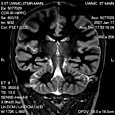 (That's a normal MRI of my brain.)
(That's a normal MRI of my brain.)  (That's a normal MRI of my brain.)
(That's a normal MRI of my brain.)
Conclusion to all of the below: My last seizures were on June 23, 2009, on that day and immediately preceding days, I had 4 grand mals in 4 days. Prior to that I had a series of different kinds of seizures, from the kaleidoscope kind referred to in this article to full on grand mals, which all finally stopped once I started taking carbamazapene religiously (I say this with crossed fingers even though I am now seizure free for so long and statistically the chances of me having another seizure is reduced significantly, though it's not entirely "normal"). I had a high initial dose but it is now 200mg ER x 2 times per day (further reduced to 200mg ER x 1 per day). I went through five seizure drugs and ten regimens before we hit upon this one. So far this seems to be working and there are no more "auras" and the weird sense of impending doom I had has gone away. That is, I feel that carbamazapene is regulating my (rather hypomanic) mood which I believe was partly correlated with my seizure activity. I also lead a healthier lifestyle and take my pills regularly. I've never felt happier.
I had my second seizure on January 2, 2007, which formally (for now) qualifies me for epilepsy or a seizure disorder. This was in a completely different situation than the first one (see below) and it fortunately happened while I was sitting down, after having spent a few hours reviewing the incoming graduate admissions candidates for my department at the University of Washington. I was walked to the UW ER (which was two minutes down the hall). An MRI, EEG, and ECG were done to disambiguate my situation, and all results have come back normal.
The MRI results have however produced some amazing high resolution images of my brain:
I had my first seizure on July 8, 2006, after a night (and week) of fairly intense partying which occurred as result of me getting tenure (a year early) in the Department of Microbiology at the University of Washington. At the time I had been dancing for many hours and drinking only water, and my sodium levels had dropped causing a seizure (hyponatremia, which is the most common electrolyte disorder affecting 1% of hospitalised patients). When I fell, I fell flat on my back, and this caused two of my vertebrae to be fractured. The Swedish Hospital ER where I was taken to did some Computed Tomography (CT) scans of both my back and my head. They noticed some minor compression fractures in my vertebrae, and didn't notice any abnormalities in my brain:
In the second situation, I was fortunately sitting down after having just reviewed the admissions files for the Department's Ph.D. program in 2007 (I'm the Chair of the Admissions Committee) and was just reviewing them with the program assistant when I had another seizure. This time there was less physical damage done. I was taken to the UW ER and they put me on the anti-seizure medication Dilantin (phenytoin).
Dilantin does seem to have the affect of quietening down my brain, and while it has been hailed as a remarkable medication, I am uncertain as to its efficacy. There are also some unpleasant side effects (made noticeable most by my loading dose, where you take 1gm of this substance in a period of 12 hours), such as dizziness and ataxia, which seem to be decreasing.
Back to the causes of seizures, which no one really knows anything about: there is very little overlap between the two situations. In both cases, within 5-10 minutes, I recovered just fine and didn't seem to notice anything was wrong. The only commonality I can find is sleep deprivation since I have poor sleeping habits, and it may well be catching up to me. The fact that the MRI, EEG, and ECG came back normal is confounding in some respects and explanatory in others (in that nonneurological causes may be considered independently, though this is not reliable).
So far we have:
# Ion | Normal | Seizure 2 | Seizure 1 | Standard range Sodium | 137 140 140 | 135 | 128 | 135-148 mEq/L Potassium | 4.4 4.1 3.6 | 3.3 | 3.8 | 3.5-5.5 mEq/L Chloride | 98 101 99 | 100 | 91 | 95-110 mEq/L Phosphate | 3.3 | 1.6 | | 2.5-4.5 mg/dL Magnesium | | 2.6 | | 1.8-2.4 mg/DL Calcium | 9.5 10.1 10.5 | 9.3 | 9.4 | 8.5-10.6 mg/dL
Philosophically, I had (and still have) the arrogance to think I could control the activities of my mind to suit my lifestyle and needs (to advance science). So I am a bit puzzled and humbled that my brain has chosen to rebel back in this manner. However, I feel that the additional diagnostic tests are a way to peer further into my mind's workings, and I hope to learn and come out of it stronger.
Here are some statistics about seizures, mostly from the Epilepsy Foundation: